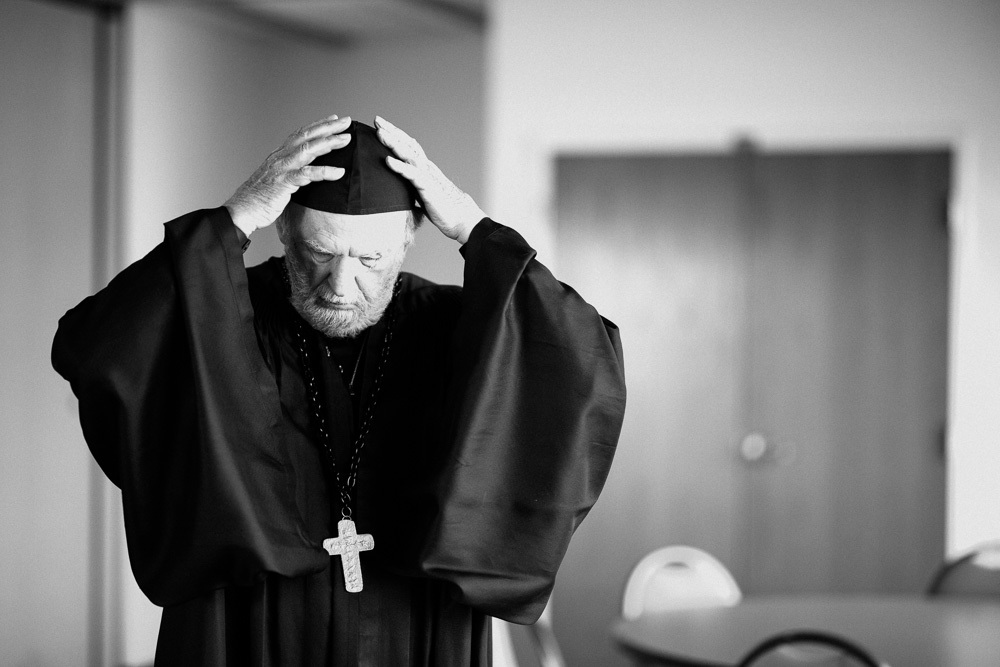If the Catholic-priest-turned-Anabaptist-radical Menno Simons were on a speaking tour, you’d expect him to make a stop at his namesake university. But he died in 1561, and so when Simons showed up last week at Eastern Mennonite University, he looked an awful lot like Gerald Brunk.

Brunk, who taught in the EMU history department for 36 years and before last week had already presented his impersonation of Simons 96 times, performed “My Road to Decision” in a Feb. 8 seminary chapel service. It’s a bringing-to-life of the writings of Simons focused on the 11 years that culminated in his becoming an Anabaptist.
Brunk said that his years of impersonating Simons has had a “tremendous impact” on him.
“It has enabled me not only to understand Menno, but to try to get some feel of what kind of struggle he went through, and what kind of revelations he had,” he said: “The courage, the tremendous courage the man had, in him going out as a fugitive and preaching the word.”
A priest’s ‘soul struggle’
Dressed in black robes and cap and wearing a silver cross around his neck, Brunk embodied the “soul struggle” that Simons faced beginning in 1525.
Over the next 11 years, as he came to embrace nonviolence and the “heresy” of Anabaptism, Simons began to read the Bible – something that in all his monastic years he’d never before done.
Listen to the seminary chapel podcast of “My Road to Decision.”
He began to feel “nagging doubt” about whether during communion the wine and bread actually became the blood and flesh of Christ and about church doctrine about baptism. He scoured the Bible for clarity, and eventually concluded that scripture contradicted church teaching.
But he was still an active priest – until something happened that led him to give up the priesthood: In nearby Münster, a group of Anabaptists attempted to establish a “new Jerusalem” by violently taking over the city.
“My brother,” said Brunk speaking as Simons, “was part of a group that took over an old monastery not too far from where we are. One hundred and thirty of them were killed outright, and the rest were executed – including my brother.”
Simons had read in the Bible that Jesus in the Sermon on the Mount had called for his followers to love their enemies, to do good to their persecutors. He had read that in the garden where Jesus was arrested, when his disciple Peter used his sword and sliced off the ear of the servant of the high priest, Jesus said to him, “They who use the sword will die by the sword.”
And Simons’ brother’s name was Peter.
“He had taken the sword, and he had died by the sword, just as Jesus said,” Simons told the audience, “and so I would write in one of my books these words: ‘The regenerated do not go to war. Neither do they engage in strife. They are the children of peace, who have beaten their swords into plowshares and their spears into pruning hooks.’”
What pushed him to act on his growing convictions, though, was seeing his brother’s and others’ courage to act – albeit violently – on their faith.
“My God,” he prayed, “forgive me for my hypocrisy…. Give me the courage to preach your word as I know it.”
He began preaching Anabaptist doctrine, then stepped down from the priesthood, and later was himself rebaptised. Although he became a hunted man and faced many difficulties, he was not martyred: he married, had three children, and lived another 25 years before dying a natural death at age 66.
“What pains me so,” Simons concluded, “are those who have been executed because of me, either because they gave me shelter or my family shelter, or read my books.”
Awareness and appreciation

Seminary student David Gingerich said that Simons’ heartbreak – over the martyrdom of his followers while he lived – made him think of parallels both in the life of Jesus, who also knew his followers would face persecution, but also in parenting.
“I’m training my kids to have that same faith, hopefully training them to be countercultural in a lot of ways that may be costly for them,” he said. “How do I do that as a parent? For people in Menno’s time who were withholding baptism from their babies, it probably seemed cruel – and then at the same time I’m training my children to be able to make their own choices.”
Seminary professor Dorothy Jean Weaver was struck by the “moments in time when [Simons] came to new awarenesses.” People today “cannot fully appreciate how big a step” Anabaptism was for early radicals, she said.
